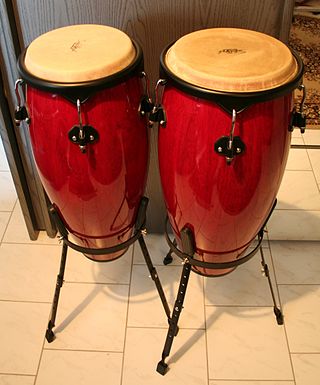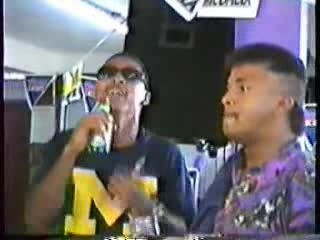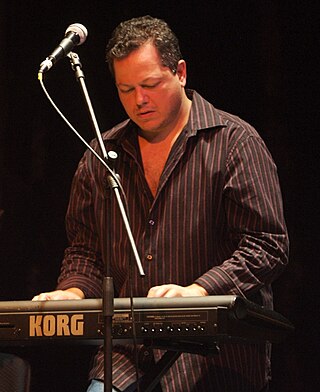Related Research Articles
The music of Latin America refers to music originating from Latin America, namely the Romance-speaking regions of the Americas south of the United States. Latin American music also incorporate the Indigenous peoples of the Americas. Due to its highly syncretic nature, Latin American music encompasses a wide variety of styles, including influential genres such as cumbia, bachata, bossa nova, merengue, rumba, salsa, samba, son, and tango. During the 20th century, many styles were influenced by the music of the United States giving rise to genres such as Latin pop, rock, jazz, hip hop, and reggaeton.

Salsa music is a style of Latin American music, combining elements of Cuban, Puerto Rican, and American influences. Because most of the basic musical components predate the labeling of salsa, there have been many controversies regarding its origin. Most songs considered as salsa are primarily based on son montuno, with elements of mambo, Latin jazz, bomba, plena and guaracha. All of these elements are adapted to fit the basic son montuno template when performed within the context of salsa.

The Music of Puerto Rico has evolved as a heterogeneous and dynamic product of diverse cultural resources. The most conspicuous musical sources of Puerto Rico have primarily included European, Indigenous, and African influences, although many aspects of Puerto Rican music reflect origins elsewhere in the Caribbean. Puerto Rican music culture today comprises a wide and rich variety of genres, ranging from essentially native genres such as bomba, danza, and plena to more recent hybrid genres such as salsa, Latin trap and reggaeton. Broadly conceived, the realm of "Puerto Rican music" should naturally comprise the music culture of the millions of people of Puerto Rican descent who have lived in the United States, especially in New York City. Their music, from salsa to the boleros of Rafael Hernández, cannot be separated from the music culture of Puerto Rico itself.

The music of Colombia is an expression of Colombian culture, music genres, both traditional and modern, according with the features of each geographic region, although it is not uncommon to find different musical styles in the same region. The diversity in musical expressions found in Colombia can be seen as the result of a mixture of Amerindian, African, and European influences, as well as more modern American.

Reggaeton, also known as reggaetón and reguetón, is a style of popular and electronic music that originated in Panama during the late 1980s. It was later popularized in Puerto Rico.

Grupo Niche is a salsa group founded in 1978 in Bogotá, Colombia. In 1982, the group settled in the city of Cali, Colombia, enjoying great popularity throughout Latin America. It was founded by Jairo Varela and Alexis Lozano. Varela remained with the group throughout his life, serving as producer, director, songwriter, vocalist and guiro player. Alexis Lozano, trombone player and arranger later left to form Orquesta Guayacán. The group also included Nicolas Cristancho "Macabi" on the piano, Francisco Garcia "Porky" on the bass, Luis Pacheco, on the congas, and vocalists Jorge Bazán and Hector Viveros.

Nick Rivera Caminero, known professionally as Nicky Jam, is an American singer and actor. He is best known for hits such as "X", "Travesuras", "En la Cama", "Te Busco", "El Perdón", "Hasta el Amanecer", and "El Amante"; the latter three are from his 2017 album Fénix. He has frequently collaborated with other Latin artists such as Daddy Yankee, J Balvin, Ozuna, Plan B and Anuel AA. While his early music exemplified traditional fast-paced reggaeton, his newer compositions place more emphasis on sung vocals and romantic lyrics.
RMM Records, also known as RMM Records & Video Corp, was an independent Latin music record label established in 1987 and based in New York City. The label was most active during the late 1980s and early 1990s and produced primarily salsa, Latin jazz, and merengue music. At its peak, RMM Records employed 55 staff members and had distribution deals in 42 cities around the world, occupying 9,000 square feet in two floors at its Soho headquarters. The label was established by Fania Records promoter Ralph Mercado, who had established RMM Management in 1972 as an artist management and booking agency, providing bookings for Latin artists Tito Puente, Celia Cruz, and Ray Barretto.

Tembleque is a coconut dessert pudding from Puerto Rico. It is one of the most popular desserts in Puerto Rican cuisine.

Israel Tanenbaum-Rivera is an American pianist, music producer, composer, arranger and audio engineer who has produced more than 50 albums and participated in over 100 recordings.
Grupo Galé is a Colombian salsa music band. Their album Auténtico was nominated for Latin Grammy Award for Best Salsa Album at the Latin Grammy Awards of 2008. Their record label is Codiscos.
Alquimia is a Colombian salsa music band, originally a trio with female singer. They were nominated for best salsa album at Premio Lo Nuestro 1999.
La Misma Gente is a Colombian salsa music band founded in 1978 in Palmira, 20 miles East of Cali, by Jorge Herrera, leader and timbalero, and keyboard player Jaime Henao. It became one of the emblematic Cali salsa groups alongside Grupo Niche and Orquesta Guayacán, although unlike these groups the group was originally local to Cali and had grown out of a mainly white high school band. The group's early records are modeled after the Puerto Rican sound of trumpet quartet led Sonora Poncena, which Henao had listened to as youth, although expanded with two saxophones and a trombone. The band's first successful songs were "Juanita Ae" and "Titico". Later hits include "Hasta Que Llegaste," and "No Hay Carretera". The vocalists have changed over the band's 30 years but on the 30 Aniversario DVD the vocalists are Rey Calderon and Nelson Morales.
Los Titanes are a Colombian salsa music band. The group was founded in Barranquilla in 1981 by the trombonist Alberto Barros.
Los Nemus del Pacífico are a Colombian salsa music band. They are especially known for son montuno music, as highlighted in their video Los Nemus Del Pacifico: Greatest Hits of Salsa & Son Montuno on Discos Fuentes (2005).

Guayacán Orquesta is a Colombian salsa music band.
Antilliaanse Feesten is a Caribbean music festival that takes place in every second weekend of August in Hoogstraten, Belgium. It had 38,000 attendees in 2016. The festival was first held in 1983, and has been repeated every year except 2000.
Jose Vazquez-Cofresi is an American conga drummer, bandleader, composer and producer of Puerto Rican & Italian ancestry. He is also called Manos de Hierro, literally translated ‘Iron Hands’, a name given to him by a salsa bass player. Throughout his career as a percussionist, he has played a wide variety of Latin music styles. The first composition by Vazquez-Cofresi that was featured in a movie is Sentencia, featured in the salsa movie The Big Shot Caller (2008). One of his most famous compositions is Aña Pa Mi Tambor, recorded by La Excelencia in 2009 that was featured on ZIN 33 for Zumba Fitness and So You Think You Can Dance Canada. Monday Night Football on NBC started using La Economia, another composition written by Vazquez-Cofresi for salsa dance touchdowns made by American Football star Victor Cruz while playing for the New York Giants. Vazquez-Cofresi has also been quoted and featured in various publications about the History of Salsa and his major impact in the salsa dura musical style and movement.
This article includes an overview of the major events and trends in Latin music in the 1980s, namely in Ibero-America. This includes recordings, festivals, award ceremonies, births and deaths of Latin music artists, and the advancement and adjournment of the genre from 1980 to 1989.
This article includes an overview of the major events and trends in Latin music in the 1970s, namely in Ibero-America. This includes recordings, festivals, award ceremonies, births and deaths of Latin music artists, and the advancement and adjournment of the genre from 1970 to 1979.
References
- ↑ Vidal, Roberto (2013). "Chapter III: Public Policies on Migration in Colombia" (PDF). In Chiarello, Leonir Mario (ed.). Public Policies on Migration and Civil Society in Latin America: The Cases of Argentina, Brazil, Colombia and Mexico (PDF) (1st ed.). New York: Scalabrini International Migration Network. pp. 263–410. ISBN 978-0-9841581-5-7. Archived from the original (PDF) on 19 March 2015. Retrieved 26 December 2017.
- ↑ "Colombia". 2013-04-20. Archived from the original on 2013-04-20. Retrieved 2021-10-03.
- ↑ "Colombia". 2013-04-20. Archived from the original on 2013-04-20. Retrieved 2021-10-03.
- ↑ "Colombia". 2013-04-20. Archived from the original on 2013-04-20. Retrieved 2021-10-03.
- ↑ Peñaloza, Lina Marcela. "Why is Colombia the main international representative of Reggaeton? - LatinAmerican Post". latinamericanpost.com.
- ↑ Washburne 2008 p. 182-183.
This article needs additional or more specific categories .(July 2023) |
